Contract Law: Analysis of Negligence and Economic Loss Issues
VerifiedAdded on 2021/05/31
|10
|2253
|57
Case Study
AI Summary
This case study examines a contract law dispute involving a construction project. The analysis focuses on two key issues: whether a builder, Billy Jean, acted negligently in performing her duties under the construction contract, and whether she owed a duty of care to avoid purely economic loss to the purchaser, Donald & Co. The study applies Australian common law principles, referencing key cases like Donoghue v Stevenson, Caparo Industries PLC v Dickman, and Perre v Apand, to establish the elements of negligence – duty of care, breach of duty, causation, and injury – and to determine the circumstances under which a duty to avoid purely economic loss arises. The analysis concludes that Billy Jean was negligent and liable for damages, and that a duty of care to avoid purely economic loss was owed, though lack of expertise was a consideration. The study includes a bibliography of relevant legal texts.
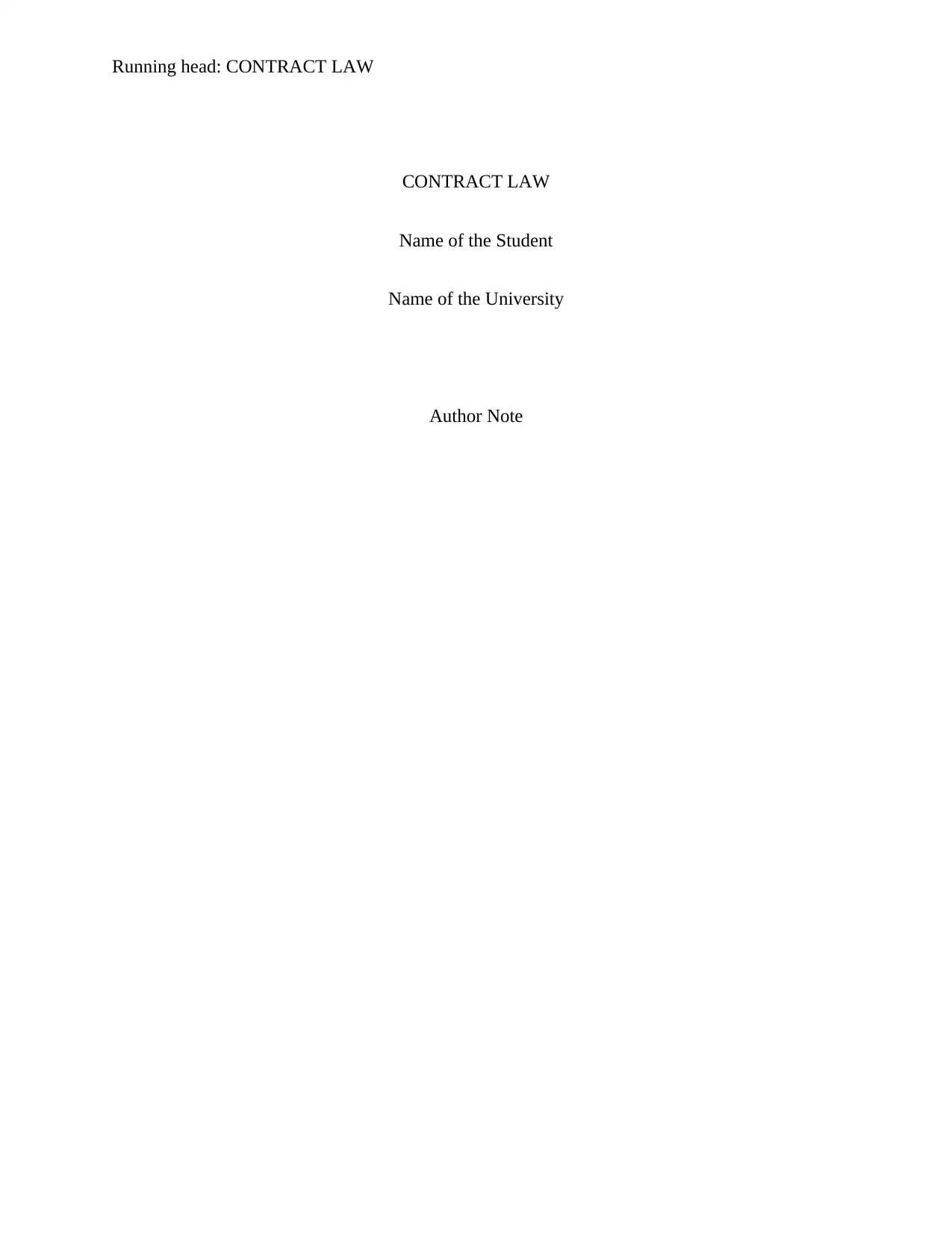
Running head: CONTRACT LAW
CONTRACT LAW
Name of the Student
Name of the University
Author Note
CONTRACT LAW
Name of the Student
Name of the University
Author Note
Paraphrase This Document
Need a fresh take? Get an instant paraphrase of this document with our AI Paraphraser
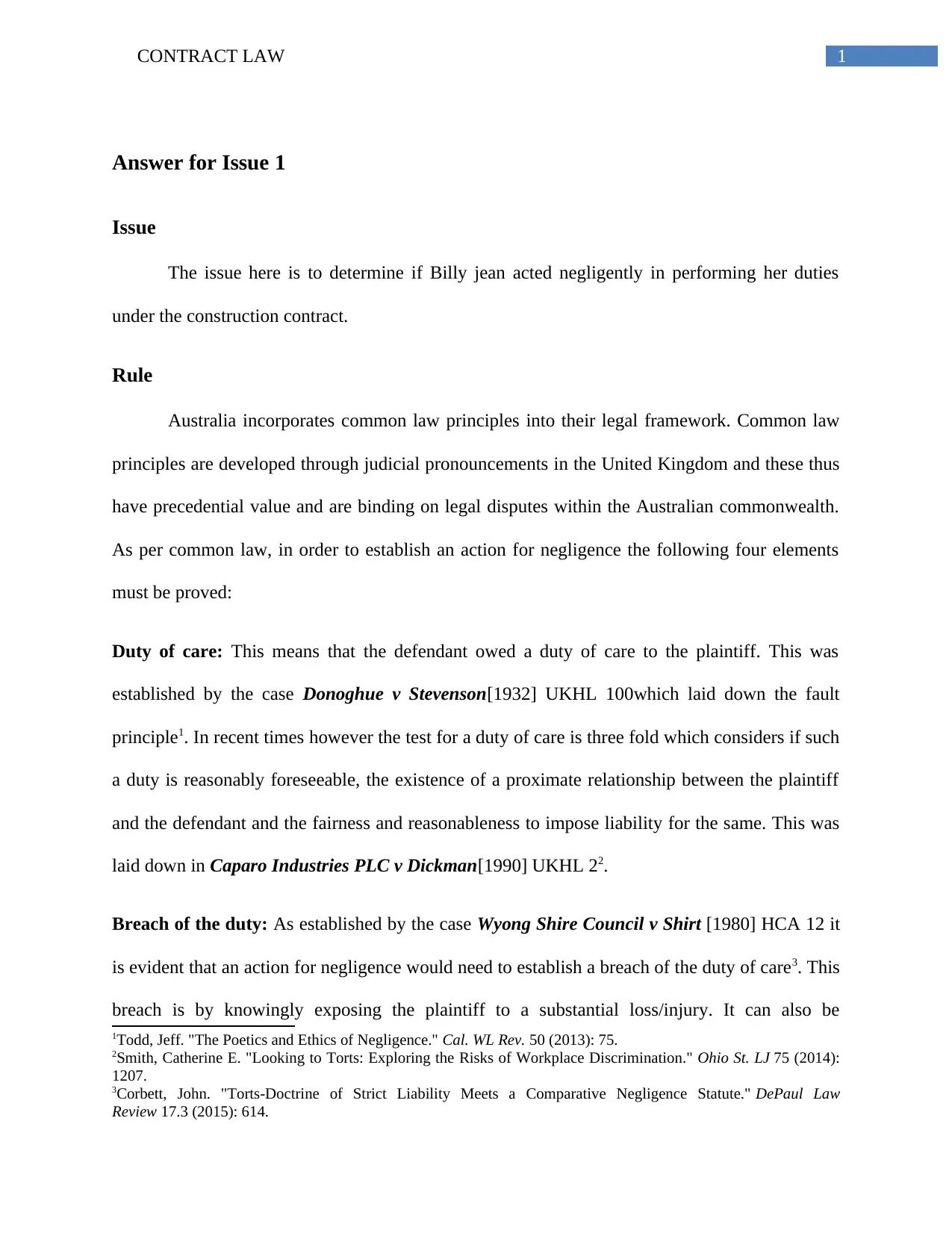
1CONTRACT LAW
Answer for Issue 1
Issue
The issue here is to determine if Billy jean acted negligently in performing her duties
under the construction contract.
Rule
Australia incorporates common law principles into their legal framework. Common law
principles are developed through judicial pronouncements in the United Kingdom and these thus
have precedential value and are binding on legal disputes within the Australian commonwealth.
As per common law, in order to establish an action for negligence the following four elements
must be proved:
Duty of care: This means that the defendant owed a duty of care to the plaintiff. This was
established by the case Donoghue v Stevenson[1932] UKHL 100which laid down the fault
principle1. In recent times however the test for a duty of care is three fold which considers if such
a duty is reasonably foreseeable, the existence of a proximate relationship between the plaintiff
and the defendant and the fairness and reasonableness to impose liability for the same. This was
laid down in Caparo Industries PLC v Dickman[1990] UKHL 22.
Breach of the duty: As established by the case Wyong Shire Council v Shirt [1980] HCA 12 it
is evident that an action for negligence would need to establish a breach of the duty of care3. This
breach is by knowingly exposing the plaintiff to a substantial loss/injury. It can also be
1Todd, Jeff. "The Poetics and Ethics of Negligence." Cal. WL Rev. 50 (2013): 75.
2Smith, Catherine E. "Looking to Torts: Exploring the Risks of Workplace Discrimination." Ohio St. LJ 75 (2014):
1207.
3Corbett, John. "Torts-Doctrine of Strict Liability Meets a Comparative Negligence Statute." DePaul Law
Review 17.3 (2015): 614.
Answer for Issue 1
Issue
The issue here is to determine if Billy jean acted negligently in performing her duties
under the construction contract.
Rule
Australia incorporates common law principles into their legal framework. Common law
principles are developed through judicial pronouncements in the United Kingdom and these thus
have precedential value and are binding on legal disputes within the Australian commonwealth.
As per common law, in order to establish an action for negligence the following four elements
must be proved:
Duty of care: This means that the defendant owed a duty of care to the plaintiff. This was
established by the case Donoghue v Stevenson[1932] UKHL 100which laid down the fault
principle1. In recent times however the test for a duty of care is three fold which considers if such
a duty is reasonably foreseeable, the existence of a proximate relationship between the plaintiff
and the defendant and the fairness and reasonableness to impose liability for the same. This was
laid down in Caparo Industries PLC v Dickman[1990] UKHL 22.
Breach of the duty: As established by the case Wyong Shire Council v Shirt [1980] HCA 12 it
is evident that an action for negligence would need to establish a breach of the duty of care3. This
breach is by knowingly exposing the plaintiff to a substantial loss/injury. It can also be
1Todd, Jeff. "The Poetics and Ethics of Negligence." Cal. WL Rev. 50 (2013): 75.
2Smith, Catherine E. "Looking to Torts: Exploring the Risks of Workplace Discrimination." Ohio St. LJ 75 (2014):
1207.
3Corbett, John. "Torts-Doctrine of Strict Liability Meets a Comparative Negligence Statute." DePaul Law
Review 17.3 (2015): 614.
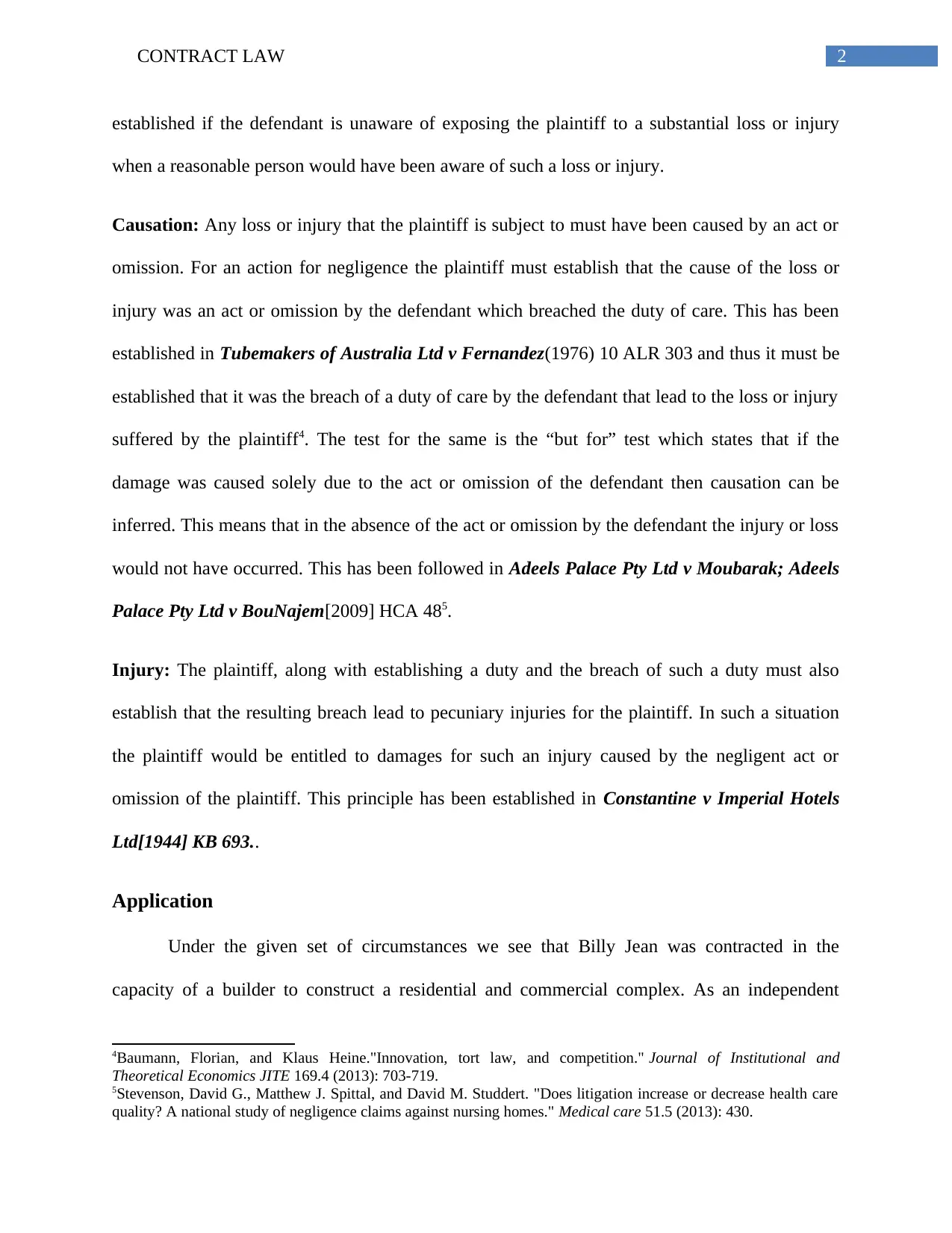
2CONTRACT LAW
established if the defendant is unaware of exposing the plaintiff to a substantial loss or injury
when a reasonable person would have been aware of such a loss or injury.
Causation: Any loss or injury that the plaintiff is subject to must have been caused by an act or
omission. For an action for negligence the plaintiff must establish that the cause of the loss or
injury was an act or omission by the defendant which breached the duty of care. This has been
established in Tubemakers of Australia Ltd v Fernandez(1976) 10 ALR 303 and thus it must be
established that it was the breach of a duty of care by the defendant that lead to the loss or injury
suffered by the plaintiff4. The test for the same is the “but for” test which states that if the
damage was caused solely due to the act or omission of the defendant then causation can be
inferred. This means that in the absence of the act or omission by the defendant the injury or loss
would not have occurred. This has been followed in Adeels Palace Pty Ltd v Moubarak; Adeels
Palace Pty Ltd v BouNajem[2009] HCA 485.
Injury: The plaintiff, along with establishing a duty and the breach of such a duty must also
establish that the resulting breach lead to pecuniary injuries for the plaintiff. In such a situation
the plaintiff would be entitled to damages for such an injury caused by the negligent act or
omission of the plaintiff. This principle has been established in Constantine v Imperial Hotels
Ltd[1944] KB 693..
Application
Under the given set of circumstances we see that Billy Jean was contracted in the
capacity of a builder to construct a residential and commercial complex. As an independent
4Baumann, Florian, and Klaus Heine."Innovation, tort law, and competition." Journal of Institutional and
Theoretical Economics JITE 169.4 (2013): 703-719.
5Stevenson, David G., Matthew J. Spittal, and David M. Studdert. "Does litigation increase or decrease health care
quality? A national study of negligence claims against nursing homes." Medical care 51.5 (2013): 430.
established if the defendant is unaware of exposing the plaintiff to a substantial loss or injury
when a reasonable person would have been aware of such a loss or injury.
Causation: Any loss or injury that the plaintiff is subject to must have been caused by an act or
omission. For an action for negligence the plaintiff must establish that the cause of the loss or
injury was an act or omission by the defendant which breached the duty of care. This has been
established in Tubemakers of Australia Ltd v Fernandez(1976) 10 ALR 303 and thus it must be
established that it was the breach of a duty of care by the defendant that lead to the loss or injury
suffered by the plaintiff4. The test for the same is the “but for” test which states that if the
damage was caused solely due to the act or omission of the defendant then causation can be
inferred. This means that in the absence of the act or omission by the defendant the injury or loss
would not have occurred. This has been followed in Adeels Palace Pty Ltd v Moubarak; Adeels
Palace Pty Ltd v BouNajem[2009] HCA 485.
Injury: The plaintiff, along with establishing a duty and the breach of such a duty must also
establish that the resulting breach lead to pecuniary injuries for the plaintiff. In such a situation
the plaintiff would be entitled to damages for such an injury caused by the negligent act or
omission of the plaintiff. This principle has been established in Constantine v Imperial Hotels
Ltd[1944] KB 693..
Application
Under the given set of circumstances we see that Billy Jean was contracted in the
capacity of a builder to construct a residential and commercial complex. As an independent
4Baumann, Florian, and Klaus Heine."Innovation, tort law, and competition." Journal of Institutional and
Theoretical Economics JITE 169.4 (2013): 703-719.
5Stevenson, David G., Matthew J. Spittal, and David M. Studdert. "Does litigation increase or decrease health care
quality? A national study of negligence claims against nursing homes." Medical care 51.5 (2013): 430.
⊘ This is a preview!⊘
Do you want full access?
Subscribe today to unlock all pages.

Trusted by 1+ million students worldwide
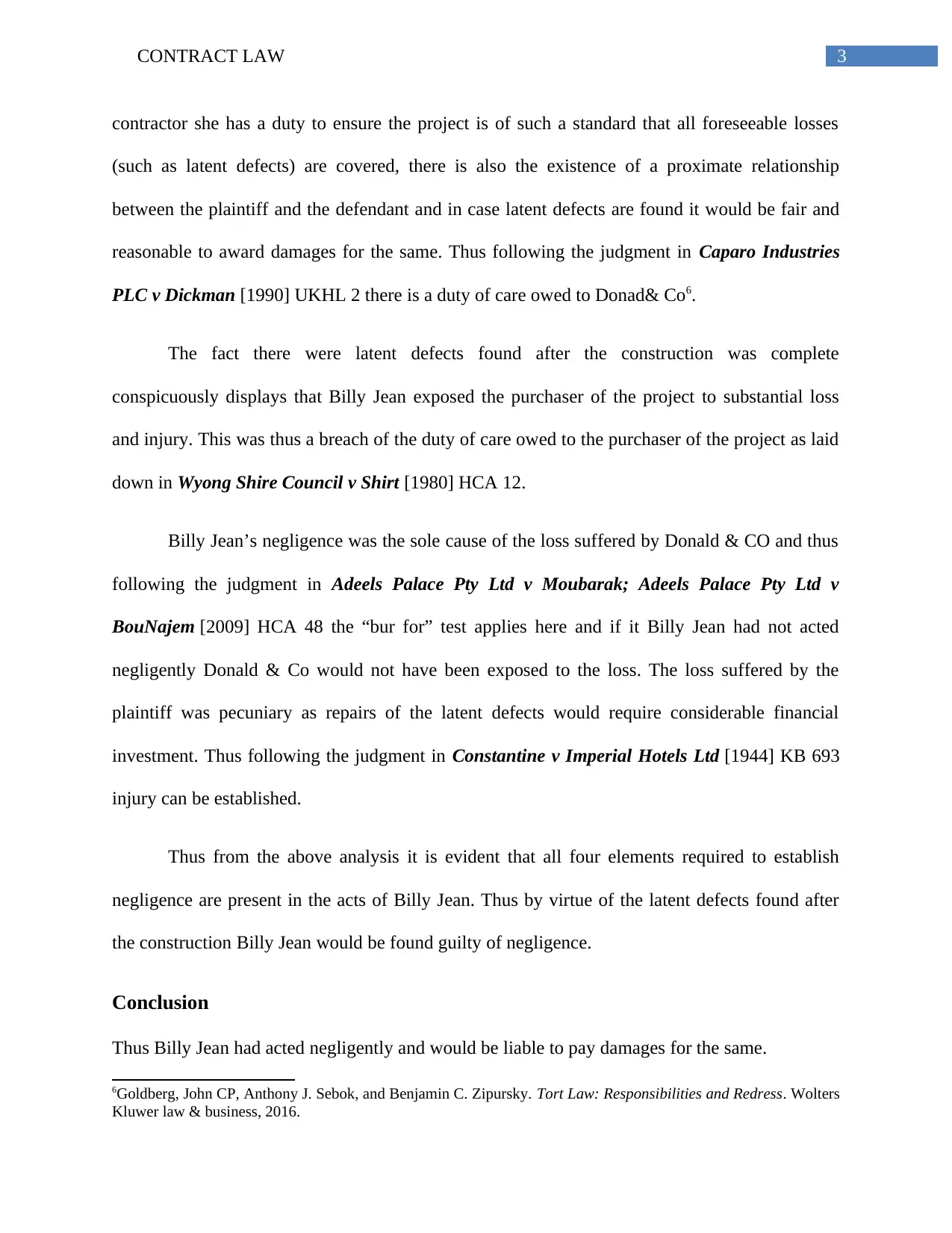
3CONTRACT LAW
contractor she has a duty to ensure the project is of such a standard that all foreseeable losses
(such as latent defects) are covered, there is also the existence of a proximate relationship
between the plaintiff and the defendant and in case latent defects are found it would be fair and
reasonable to award damages for the same. Thus following the judgment in Caparo Industries
PLC v Dickman [1990] UKHL 2 there is a duty of care owed to Donad& Co6.
The fact there were latent defects found after the construction was complete
conspicuously displays that Billy Jean exposed the purchaser of the project to substantial loss
and injury. This was thus a breach of the duty of care owed to the purchaser of the project as laid
down in Wyong Shire Council v Shirt [1980] HCA 12.
Billy Jean’s negligence was the sole cause of the loss suffered by Donald & CO and thus
following the judgment in Adeels Palace Pty Ltd v Moubarak; Adeels Palace Pty Ltd v
BouNajem [2009] HCA 48 the “bur for” test applies here and if it Billy Jean had not acted
negligently Donald & Co would not have been exposed to the loss. The loss suffered by the
plaintiff was pecuniary as repairs of the latent defects would require considerable financial
investment. Thus following the judgment in Constantine v Imperial Hotels Ltd [1944] KB 693
injury can be established.
Thus from the above analysis it is evident that all four elements required to establish
negligence are present in the acts of Billy Jean. Thus by virtue of the latent defects found after
the construction Billy Jean would be found guilty of negligence.
Conclusion
Thus Billy Jean had acted negligently and would be liable to pay damages for the same.
6Goldberg, John CP, Anthony J. Sebok, and Benjamin C. Zipursky. Tort Law: Responsibilities and Redress. Wolters
Kluwer law & business, 2016.
contractor she has a duty to ensure the project is of such a standard that all foreseeable losses
(such as latent defects) are covered, there is also the existence of a proximate relationship
between the plaintiff and the defendant and in case latent defects are found it would be fair and
reasonable to award damages for the same. Thus following the judgment in Caparo Industries
PLC v Dickman [1990] UKHL 2 there is a duty of care owed to Donad& Co6.
The fact there were latent defects found after the construction was complete
conspicuously displays that Billy Jean exposed the purchaser of the project to substantial loss
and injury. This was thus a breach of the duty of care owed to the purchaser of the project as laid
down in Wyong Shire Council v Shirt [1980] HCA 12.
Billy Jean’s negligence was the sole cause of the loss suffered by Donald & CO and thus
following the judgment in Adeels Palace Pty Ltd v Moubarak; Adeels Palace Pty Ltd v
BouNajem [2009] HCA 48 the “bur for” test applies here and if it Billy Jean had not acted
negligently Donald & Co would not have been exposed to the loss. The loss suffered by the
plaintiff was pecuniary as repairs of the latent defects would require considerable financial
investment. Thus following the judgment in Constantine v Imperial Hotels Ltd [1944] KB 693
injury can be established.
Thus from the above analysis it is evident that all four elements required to establish
negligence are present in the acts of Billy Jean. Thus by virtue of the latent defects found after
the construction Billy Jean would be found guilty of negligence.
Conclusion
Thus Billy Jean had acted negligently and would be liable to pay damages for the same.
6Goldberg, John CP, Anthony J. Sebok, and Benjamin C. Zipursky. Tort Law: Responsibilities and Redress. Wolters
Kluwer law & business, 2016.
Paraphrase This Document
Need a fresh take? Get an instant paraphrase of this document with our AI Paraphraser
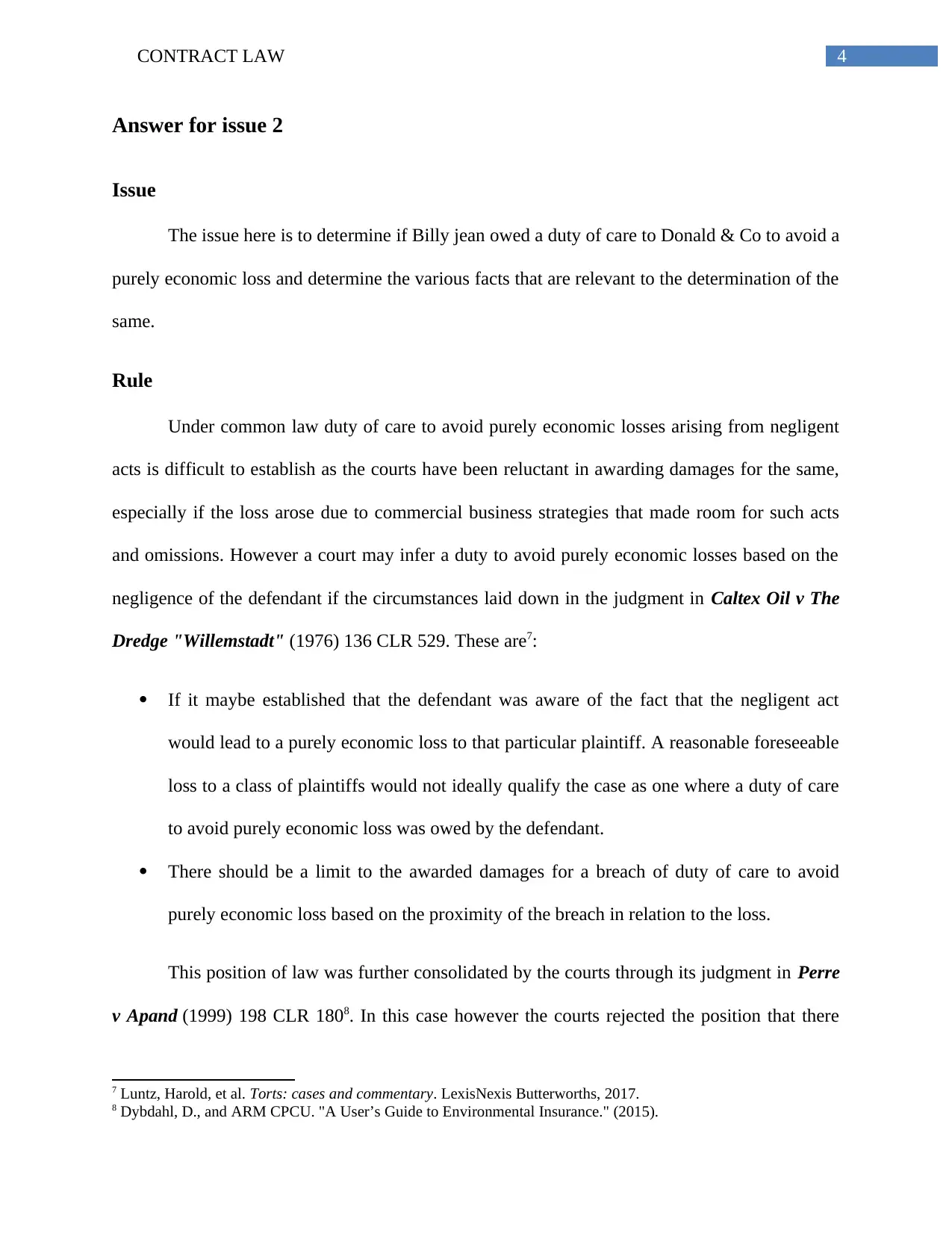
4CONTRACT LAW
Answer for issue 2
Issue
The issue here is to determine if Billy jean owed a duty of care to Donald & Co to avoid a
purely economic loss and determine the various facts that are relevant to the determination of the
same.
Rule
Under common law duty of care to avoid purely economic losses arising from negligent
acts is difficult to establish as the courts have been reluctant in awarding damages for the same,
especially if the loss arose due to commercial business strategies that made room for such acts
and omissions. However a court may infer a duty to avoid purely economic losses based on the
negligence of the defendant if the circumstances laid down in the judgment in Caltex Oil v The
Dredge "Willemstadt" (1976) 136 CLR 529. These are7:
If it maybe established that the defendant was aware of the fact that the negligent act
would lead to a purely economic loss to that particular plaintiff. A reasonable foreseeable
loss to a class of plaintiffs would not ideally qualify the case as one where a duty of care
to avoid purely economic loss was owed by the defendant.
There should be a limit to the awarded damages for a breach of duty of care to avoid
purely economic loss based on the proximity of the breach in relation to the loss.
This position of law was further consolidated by the courts through its judgment in Perre
v Apand (1999) 198 CLR 1808. In this case however the courts rejected the position that there
7 Luntz, Harold, et al. Torts: cases and commentary. LexisNexis Butterworths, 2017.
8 Dybdahl, D., and ARM CPCU. "A User’s Guide to Environmental Insurance." (2015).
Answer for issue 2
Issue
The issue here is to determine if Billy jean owed a duty of care to Donald & Co to avoid a
purely economic loss and determine the various facts that are relevant to the determination of the
same.
Rule
Under common law duty of care to avoid purely economic losses arising from negligent
acts is difficult to establish as the courts have been reluctant in awarding damages for the same,
especially if the loss arose due to commercial business strategies that made room for such acts
and omissions. However a court may infer a duty to avoid purely economic losses based on the
negligence of the defendant if the circumstances laid down in the judgment in Caltex Oil v The
Dredge "Willemstadt" (1976) 136 CLR 529. These are7:
If it maybe established that the defendant was aware of the fact that the negligent act
would lead to a purely economic loss to that particular plaintiff. A reasonable foreseeable
loss to a class of plaintiffs would not ideally qualify the case as one where a duty of care
to avoid purely economic loss was owed by the defendant.
There should be a limit to the awarded damages for a breach of duty of care to avoid
purely economic loss based on the proximity of the breach in relation to the loss.
This position of law was further consolidated by the courts through its judgment in Perre
v Apand (1999) 198 CLR 1808. In this case however the courts rejected the position that there
7 Luntz, Harold, et al. Torts: cases and commentary. LexisNexis Butterworths, 2017.
8 Dybdahl, D., and ARM CPCU. "A User’s Guide to Environmental Insurance." (2015).
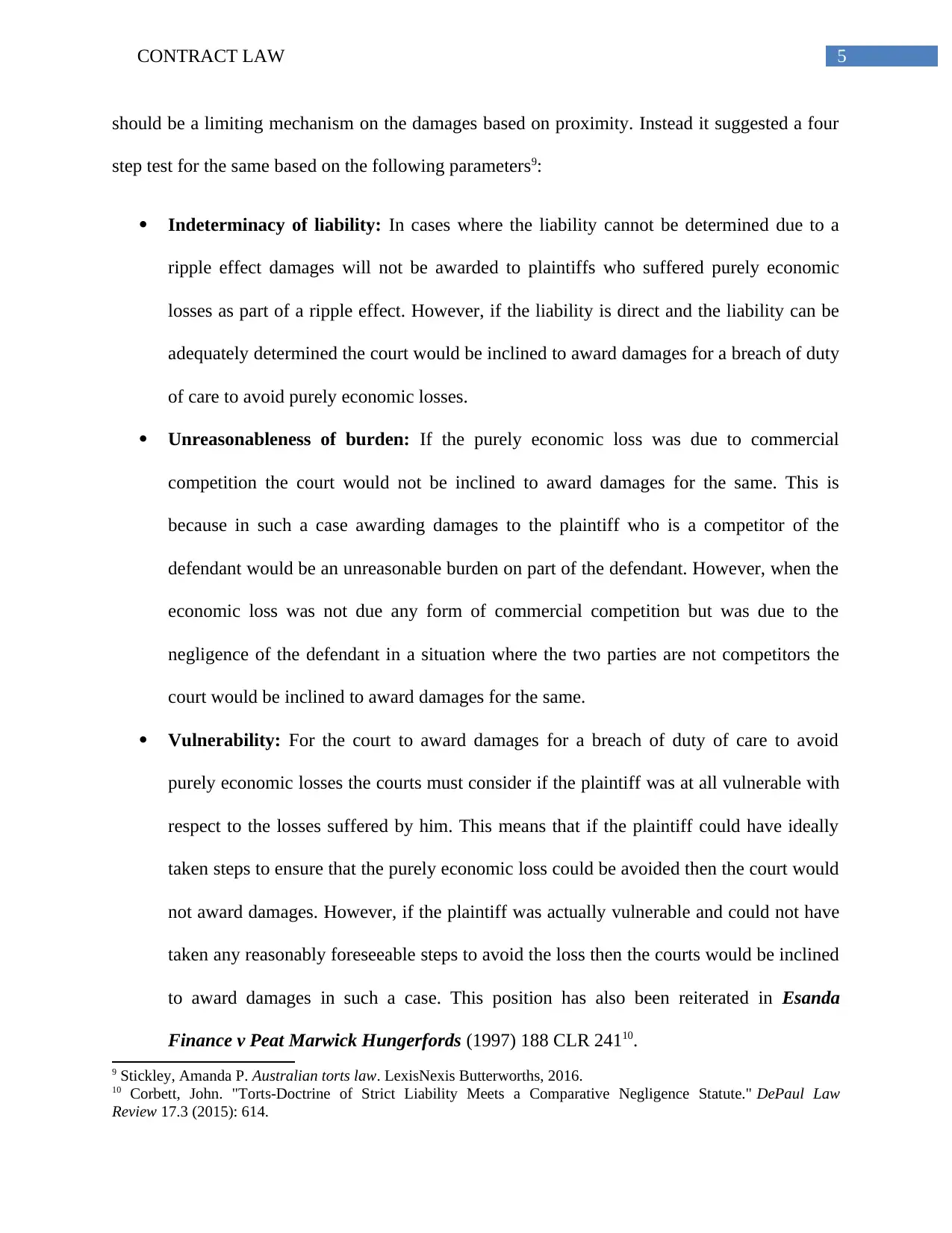
5CONTRACT LAW
should be a limiting mechanism on the damages based on proximity. Instead it suggested a four
step test for the same based on the following parameters9:
Indeterminacy of liability: In cases where the liability cannot be determined due to a
ripple effect damages will not be awarded to plaintiffs who suffered purely economic
losses as part of a ripple effect. However, if the liability is direct and the liability can be
adequately determined the court would be inclined to award damages for a breach of duty
of care to avoid purely economic losses.
Unreasonableness of burden: If the purely economic loss was due to commercial
competition the court would not be inclined to award damages for the same. This is
because in such a case awarding damages to the plaintiff who is a competitor of the
defendant would be an unreasonable burden on part of the defendant. However, when the
economic loss was not due any form of commercial competition but was due to the
negligence of the defendant in a situation where the two parties are not competitors the
court would be inclined to award damages for the same.
Vulnerability: For the court to award damages for a breach of duty of care to avoid
purely economic losses the courts must consider if the plaintiff was at all vulnerable with
respect to the losses suffered by him. This means that if the plaintiff could have ideally
taken steps to ensure that the purely economic loss could be avoided then the court would
not award damages. However, if the plaintiff was actually vulnerable and could not have
taken any reasonably foreseeable steps to avoid the loss then the courts would be inclined
to award damages in such a case. This position has also been reiterated in Esanda
Finance v Peat Marwick Hungerfords (1997) 188 CLR 24110.
9 Stickley, Amanda P. Australian torts law. LexisNexis Butterworths, 2016.
10 Corbett, John. "Torts-Doctrine of Strict Liability Meets a Comparative Negligence Statute." DePaul Law
Review 17.3 (2015): 614.
should be a limiting mechanism on the damages based on proximity. Instead it suggested a four
step test for the same based on the following parameters9:
Indeterminacy of liability: In cases where the liability cannot be determined due to a
ripple effect damages will not be awarded to plaintiffs who suffered purely economic
losses as part of a ripple effect. However, if the liability is direct and the liability can be
adequately determined the court would be inclined to award damages for a breach of duty
of care to avoid purely economic losses.
Unreasonableness of burden: If the purely economic loss was due to commercial
competition the court would not be inclined to award damages for the same. This is
because in such a case awarding damages to the plaintiff who is a competitor of the
defendant would be an unreasonable burden on part of the defendant. However, when the
economic loss was not due any form of commercial competition but was due to the
negligence of the defendant in a situation where the two parties are not competitors the
court would be inclined to award damages for the same.
Vulnerability: For the court to award damages for a breach of duty of care to avoid
purely economic losses the courts must consider if the plaintiff was at all vulnerable with
respect to the losses suffered by him. This means that if the plaintiff could have ideally
taken steps to ensure that the purely economic loss could be avoided then the court would
not award damages. However, if the plaintiff was actually vulnerable and could not have
taken any reasonably foreseeable steps to avoid the loss then the courts would be inclined
to award damages in such a case. This position has also been reiterated in Esanda
Finance v Peat Marwick Hungerfords (1997) 188 CLR 24110.
9 Stickley, Amanda P. Australian torts law. LexisNexis Butterworths, 2016.
10 Corbett, John. "Torts-Doctrine of Strict Liability Meets a Comparative Negligence Statute." DePaul Law
Review 17.3 (2015): 614.
⊘ This is a preview!⊘
Do you want full access?
Subscribe today to unlock all pages.

Trusted by 1+ million students worldwide
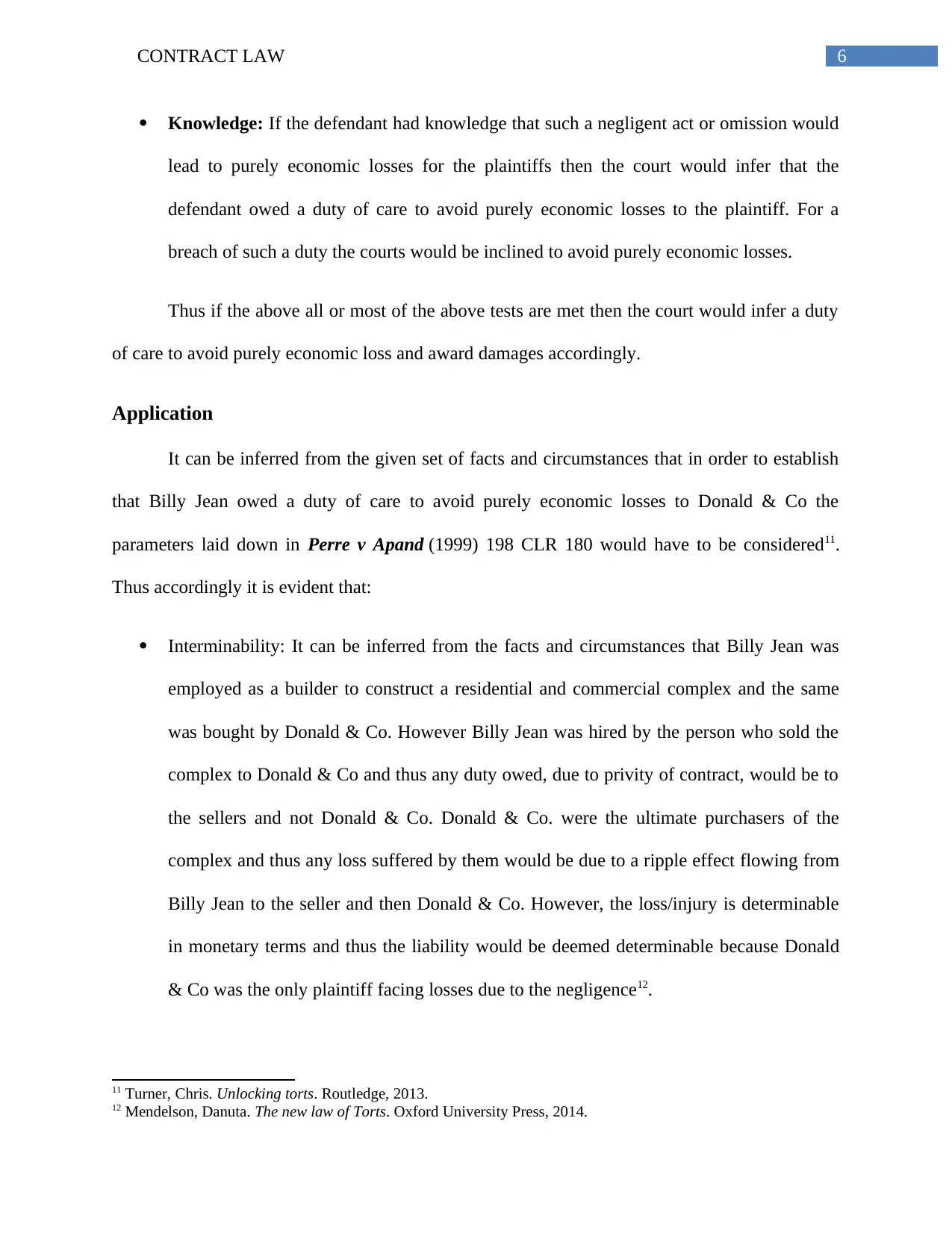
6CONTRACT LAW
Knowledge: If the defendant had knowledge that such a negligent act or omission would
lead to purely economic losses for the plaintiffs then the court would infer that the
defendant owed a duty of care to avoid purely economic losses to the plaintiff. For a
breach of such a duty the courts would be inclined to avoid purely economic losses.
Thus if the above all or most of the above tests are met then the court would infer a duty
of care to avoid purely economic loss and award damages accordingly.
Application
It can be inferred from the given set of facts and circumstances that in order to establish
that Billy Jean owed a duty of care to avoid purely economic losses to Donald & Co the
parameters laid down in Perre v Apand (1999) 198 CLR 180 would have to be considered11.
Thus accordingly it is evident that:
Interminability: It can be inferred from the facts and circumstances that Billy Jean was
employed as a builder to construct a residential and commercial complex and the same
was bought by Donald & Co. However Billy Jean was hired by the person who sold the
complex to Donald & Co and thus any duty owed, due to privity of contract, would be to
the sellers and not Donald & Co. Donald & Co. were the ultimate purchasers of the
complex and thus any loss suffered by them would be due to a ripple effect flowing from
Billy Jean to the seller and then Donald & Co. However, the loss/injury is determinable
in monetary terms and thus the liability would be deemed determinable because Donald
& Co was the only plaintiff facing losses due to the negligence12.
11 Turner, Chris. Unlocking torts. Routledge, 2013.
12 Mendelson, Danuta. The new law of Torts. Oxford University Press, 2014.
Knowledge: If the defendant had knowledge that such a negligent act or omission would
lead to purely economic losses for the plaintiffs then the court would infer that the
defendant owed a duty of care to avoid purely economic losses to the plaintiff. For a
breach of such a duty the courts would be inclined to avoid purely economic losses.
Thus if the above all or most of the above tests are met then the court would infer a duty
of care to avoid purely economic loss and award damages accordingly.
Application
It can be inferred from the given set of facts and circumstances that in order to establish
that Billy Jean owed a duty of care to avoid purely economic losses to Donald & Co the
parameters laid down in Perre v Apand (1999) 198 CLR 180 would have to be considered11.
Thus accordingly it is evident that:
Interminability: It can be inferred from the facts and circumstances that Billy Jean was
employed as a builder to construct a residential and commercial complex and the same
was bought by Donald & Co. However Billy Jean was hired by the person who sold the
complex to Donald & Co and thus any duty owed, due to privity of contract, would be to
the sellers and not Donald & Co. Donald & Co. were the ultimate purchasers of the
complex and thus any loss suffered by them would be due to a ripple effect flowing from
Billy Jean to the seller and then Donald & Co. However, the loss/injury is determinable
in monetary terms and thus the liability would be deemed determinable because Donald
& Co was the only plaintiff facing losses due to the negligence12.
11 Turner, Chris. Unlocking torts. Routledge, 2013.
12 Mendelson, Danuta. The new law of Torts. Oxford University Press, 2014.
Paraphrase This Document
Need a fresh take? Get an instant paraphrase of this document with our AI Paraphraser
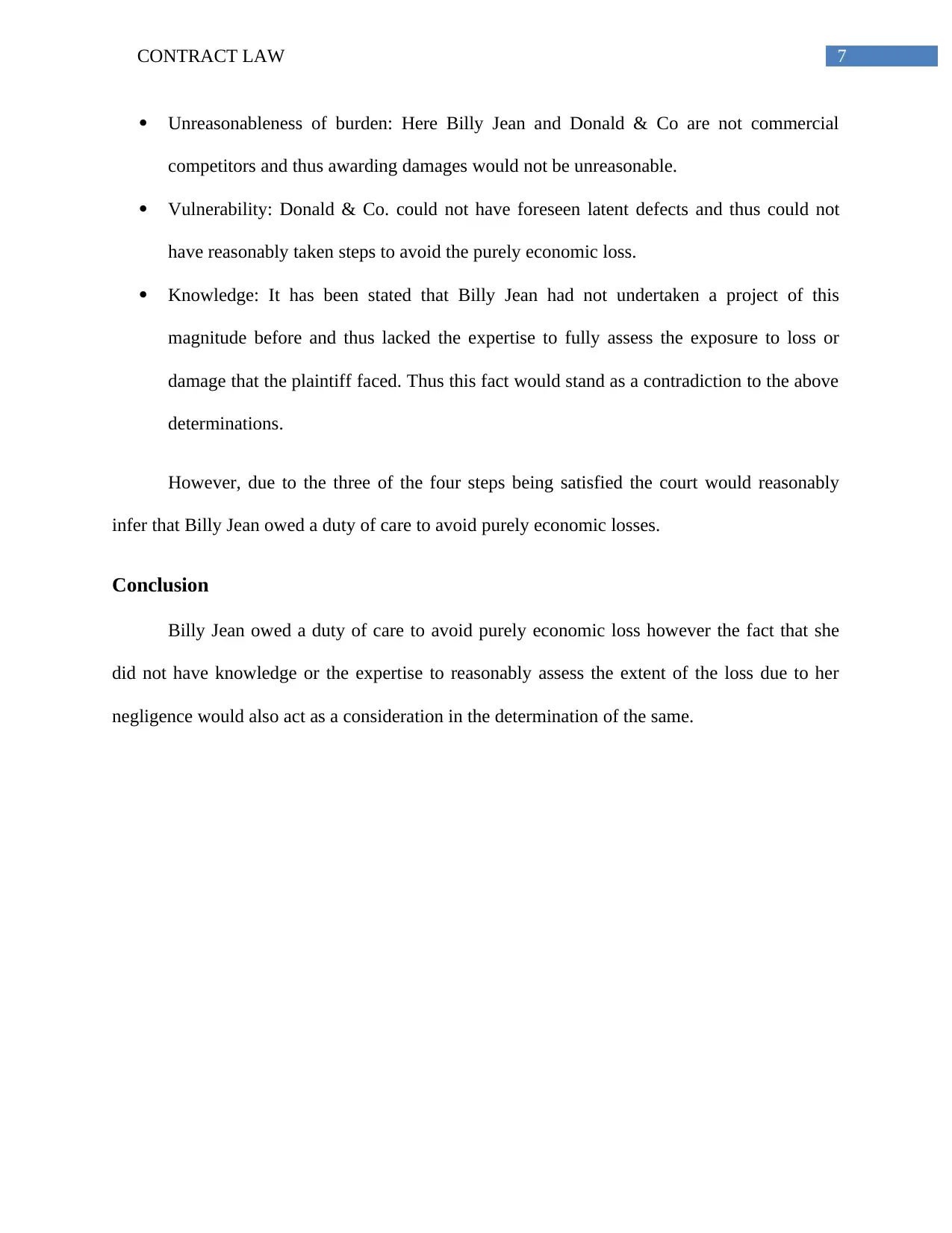
7CONTRACT LAW
Unreasonableness of burden: Here Billy Jean and Donald & Co are not commercial
competitors and thus awarding damages would not be unreasonable.
Vulnerability: Donald & Co. could not have foreseen latent defects and thus could not
have reasonably taken steps to avoid the purely economic loss.
Knowledge: It has been stated that Billy Jean had not undertaken a project of this
magnitude before and thus lacked the expertise to fully assess the exposure to loss or
damage that the plaintiff faced. Thus this fact would stand as a contradiction to the above
determinations.
However, due to the three of the four steps being satisfied the court would reasonably
infer that Billy Jean owed a duty of care to avoid purely economic losses.
Conclusion
Billy Jean owed a duty of care to avoid purely economic loss however the fact that she
did not have knowledge or the expertise to reasonably assess the extent of the loss due to her
negligence would also act as a consideration in the determination of the same.
Unreasonableness of burden: Here Billy Jean and Donald & Co are not commercial
competitors and thus awarding damages would not be unreasonable.
Vulnerability: Donald & Co. could not have foreseen latent defects and thus could not
have reasonably taken steps to avoid the purely economic loss.
Knowledge: It has been stated that Billy Jean had not undertaken a project of this
magnitude before and thus lacked the expertise to fully assess the exposure to loss or
damage that the plaintiff faced. Thus this fact would stand as a contradiction to the above
determinations.
However, due to the three of the four steps being satisfied the court would reasonably
infer that Billy Jean owed a duty of care to avoid purely economic losses.
Conclusion
Billy Jean owed a duty of care to avoid purely economic loss however the fact that she
did not have knowledge or the expertise to reasonably assess the extent of the loss due to her
negligence would also act as a consideration in the determination of the same.
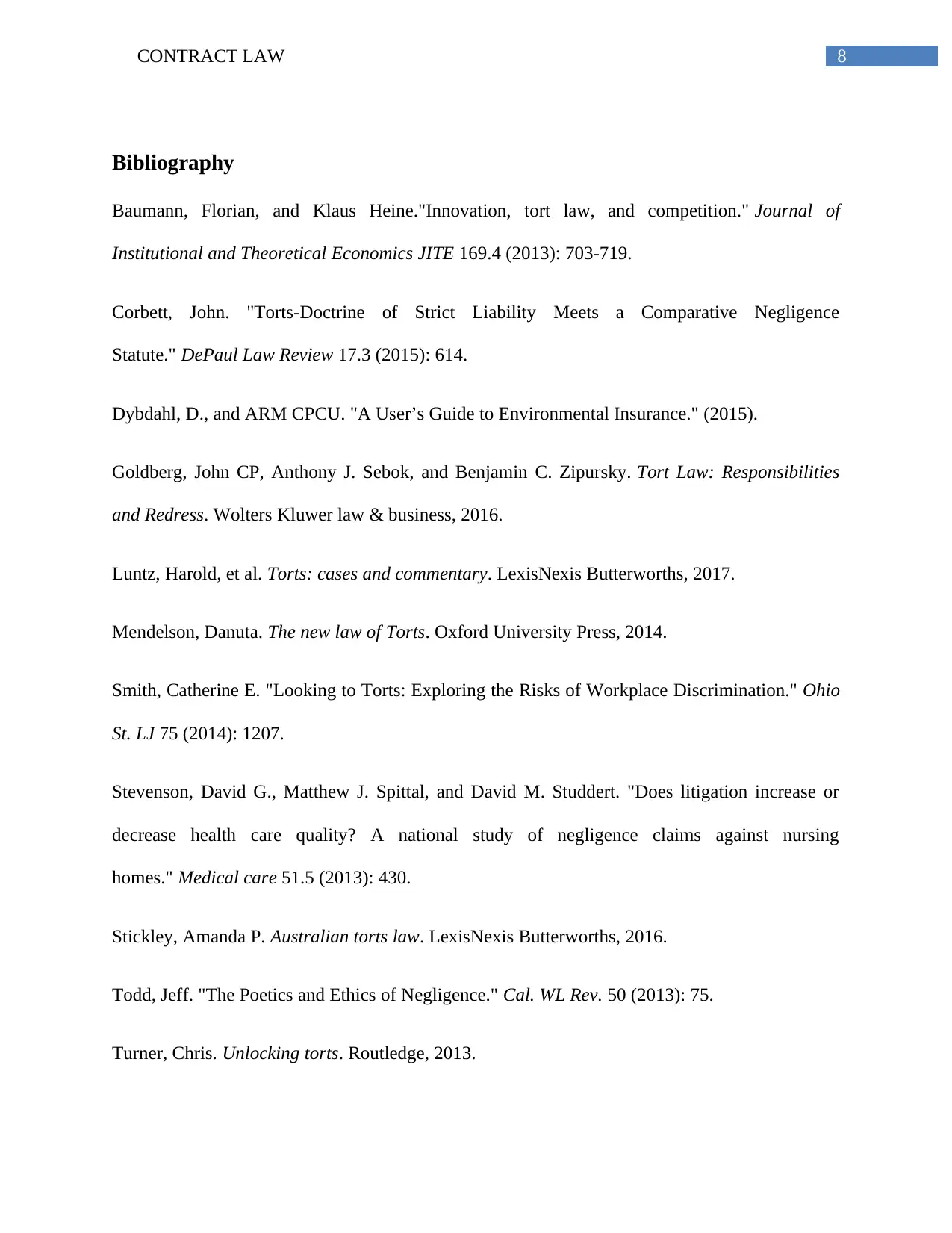
8CONTRACT LAW
Bibliography
Baumann, Florian, and Klaus Heine."Innovation, tort law, and competition." Journal of
Institutional and Theoretical Economics JITE 169.4 (2013): 703-719.
Corbett, John. "Torts-Doctrine of Strict Liability Meets a Comparative Negligence
Statute." DePaul Law Review 17.3 (2015): 614.
Dybdahl, D., and ARM CPCU. "A User’s Guide to Environmental Insurance." (2015).
Goldberg, John CP, Anthony J. Sebok, and Benjamin C. Zipursky. Tort Law: Responsibilities
and Redress. Wolters Kluwer law & business, 2016.
Luntz, Harold, et al. Torts: cases and commentary. LexisNexis Butterworths, 2017.
Mendelson, Danuta. The new law of Torts. Oxford University Press, 2014.
Smith, Catherine E. "Looking to Torts: Exploring the Risks of Workplace Discrimination." Ohio
St. LJ 75 (2014): 1207.
Stevenson, David G., Matthew J. Spittal, and David M. Studdert. "Does litigation increase or
decrease health care quality? A national study of negligence claims against nursing
homes." Medical care 51.5 (2013): 430.
Stickley, Amanda P. Australian torts law. LexisNexis Butterworths, 2016.
Todd, Jeff. "The Poetics and Ethics of Negligence." Cal. WL Rev. 50 (2013): 75.
Turner, Chris. Unlocking torts. Routledge, 2013.
Bibliography
Baumann, Florian, and Klaus Heine."Innovation, tort law, and competition." Journal of
Institutional and Theoretical Economics JITE 169.4 (2013): 703-719.
Corbett, John. "Torts-Doctrine of Strict Liability Meets a Comparative Negligence
Statute." DePaul Law Review 17.3 (2015): 614.
Dybdahl, D., and ARM CPCU. "A User’s Guide to Environmental Insurance." (2015).
Goldberg, John CP, Anthony J. Sebok, and Benjamin C. Zipursky. Tort Law: Responsibilities
and Redress. Wolters Kluwer law & business, 2016.
Luntz, Harold, et al. Torts: cases and commentary. LexisNexis Butterworths, 2017.
Mendelson, Danuta. The new law of Torts. Oxford University Press, 2014.
Smith, Catherine E. "Looking to Torts: Exploring the Risks of Workplace Discrimination." Ohio
St. LJ 75 (2014): 1207.
Stevenson, David G., Matthew J. Spittal, and David M. Studdert. "Does litigation increase or
decrease health care quality? A national study of negligence claims against nursing
homes." Medical care 51.5 (2013): 430.
Stickley, Amanda P. Australian torts law. LexisNexis Butterworths, 2016.
Todd, Jeff. "The Poetics and Ethics of Negligence." Cal. WL Rev. 50 (2013): 75.
Turner, Chris. Unlocking torts. Routledge, 2013.
⊘ This is a preview!⊘
Do you want full access?
Subscribe today to unlock all pages.

Trusted by 1+ million students worldwide
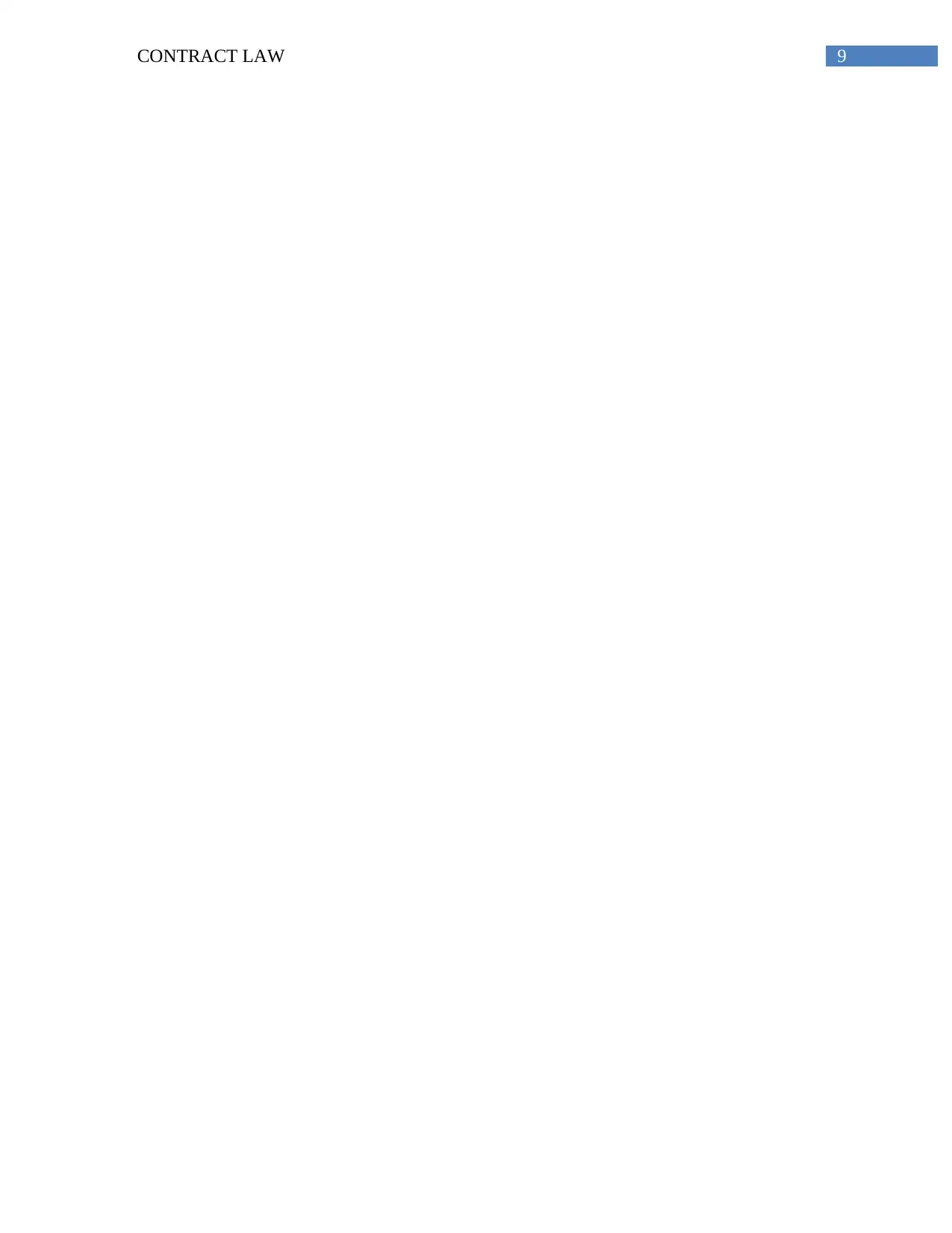
9CONTRACT LAW
1 out of 10
Related Documents
Your All-in-One AI-Powered Toolkit for Academic Success.
+13062052269
info@desklib.com
Available 24*7 on WhatsApp / Email
![[object Object]](/_next/static/media/star-bottom.7253800d.svg)
Unlock your academic potential
© 2024 | Zucol Services PVT LTD | All rights reserved.





